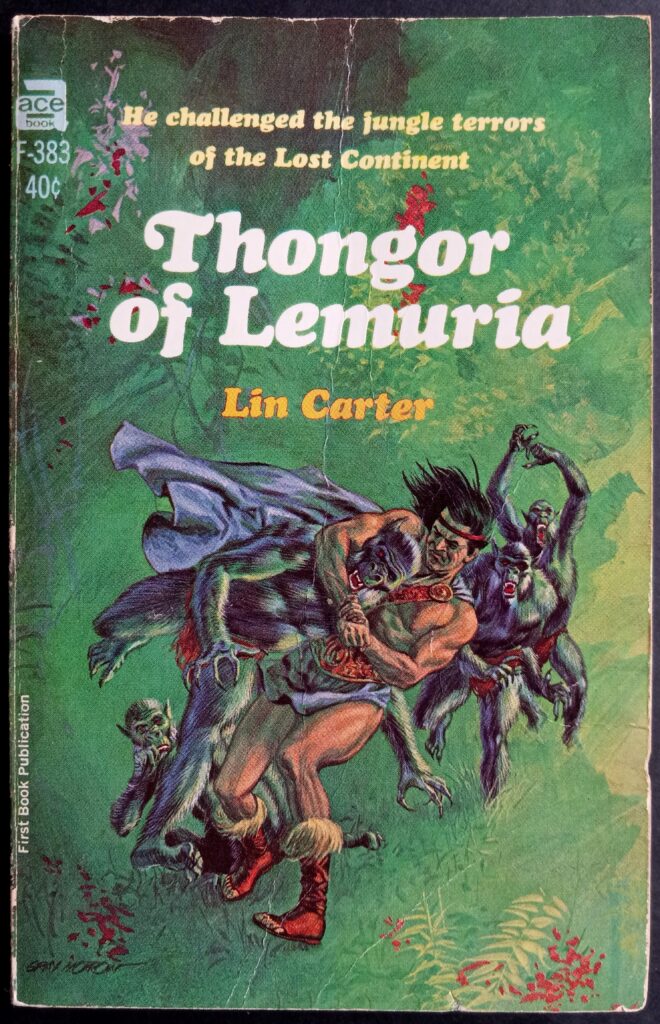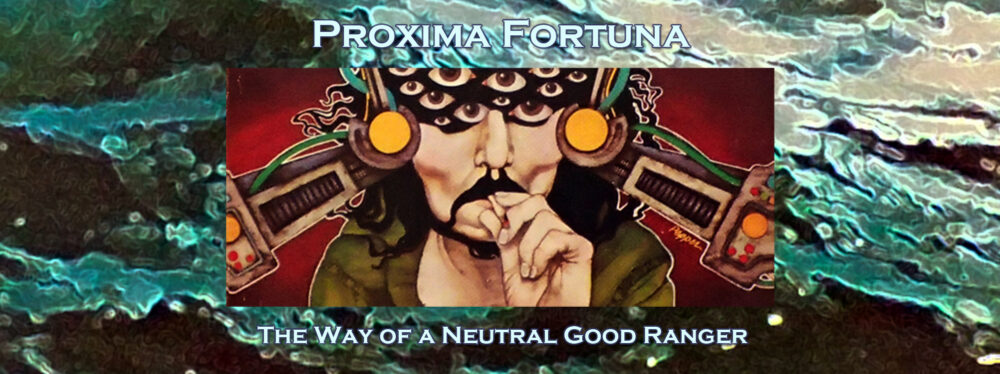During the first part of 2023 I began to read ‘Imaginary Worlds‘ by Lin Carter and for the life of me I don’t recall what exactly possessed me to pick that book to start reading other than it had been sitting on the shelf for some time.
It was among a handful of books, hastily grabbed, when we left Colorado in 2020, somewhat documented here: Finding Home.
‘Imaginary Worlds’ was also the singular book I brought on our return trip to Istanbul in the spring 2023 as well. I may have been better served reading a guide book of that ancient city but, then again, maybe not.
I do know this, reading it lit a fire under my ass.

I feel I owe Carter a debt of thanks when it comes to book hoarding…ermmm, I mean collecting.
If it hadn’t been for his work with the Ballantine Adult Fantasy series my passion for paperbacks may not have blossomed at all, and yet, I have not read a single Carter story.
This may be due in part to not having heard favorable reviews of his works or writing style and a personal dislike of the deCamp/Carter Conan Howard ‘collaborations’ for Lancer/Ace.
It’s just a hangup of mine.
Reading Carter IS in the cards for me, it WILL happen.
Thongor awaits me a few hills over.

I do however enjoy Carter’s editors notes very much, especially his introductions in the ‘Ballantine Adult Fantasy’ series as well as “the year that was” notes for DAW’s ‘The Year’s Best Fantasy Stories’.
I’ve always felt he excelled at that type of writing, he has a way to piqued my interests and have me take note of what it is he’s writing about.
Neil Gaiman also has this same superpower which I ever so briefly touch on here: The Stars My Destination.
At some point in Istanbul Carter really got his hooks in me with ‘Imaginary Worlds’, in particular I returned several times to his write up about James Branch Cabell and ‘Jurgen’. I was fascinated by this story and made note to find a copy when I got home.
After the trip and having finished Carter I stumbled upon Brian Murphy’s ‘Flame and Crimson‘.
In it Murphy lists out a probable timeline of Sword-and-Sorcery. For the year 1919 he writes:
“James Branch Cabell’s sardonic, cynical “hero” of Jurgen: A Comedy of Justice provides an unlikely source of inspiration for Robert E. Howard, Fritz Lieber, Michael Moorcock, and Karl Edward Wagner, among other.“
(FaC; pg. 249)
If Carter had lit the fire, Murphy was now piling on the wood.
But before I could start ‘Jurgen’ there would be a 7 month delay as construction season was about to begin.
Reading, on hold.
It is now January 2024, I’ve completed a first read of ‘Jurgen’ last month and I’m still trying to wrap my head around what it is I read.
I’m finding it difficult to write down much more than superficial observations or to express, in a cogent manner, my thoughts around it that may do some justice to writer or story.
I may be ill equipped to do so.
What I will do is offer up some simple ideas that struck me during the read, what I found interesting and/or excellent wordsmithing.
Anything else on my part would be folly and likely embarrassing.
‘Jurgen’ was first published in 1919, 104 years ago, for me that’s almost 2 full lifetimes. A lot has happened between then and now, in fact so much so that Branch Cabell is now a mostly forgotten author and ‘Jurgen’ has all but fallen off the map.
Mostly, save for us odd folk of the genre.
In my 30’s, I lived in an apartment on the second floor of a house built in 1913.
Back then it had been a fine, upper middle-class single family brick home in a neighborhood of stately homes on the edge of a grand city park…but that, was a long time ago.
By the time I came to inhabited it, things had changed.
At some point in its history it had been converted into 6 separate apartments and had been rented out for decades. It was not very well maintained and decades of renting had taken its toll.
It was hot in the summer, cold in the winter.
There were constant plumbing issues.
Pigeons haunted all the eves.
It smelled of decaying wood.
Likely it was haunted. My brother bears witness to a spectral encounter and honestly, I cannot dismiss his account.
I did without many conveniences that a newer rental would have provided but, I loved the place and lived there for 10 years.
It took some getting used to at first but eventually I became accustomed to the quirks and over time learned to live with them, not against them.


‘Jurgen’ is an old house, with its own quirks to get used to and I struggled with them during this first read.
Branch Cabell is a new voice in my head speaking from a different time and different region of the country.
I remember my first serious read of Howard and Conan required having a dictionary on hand so I could look up the words he used…not all, but some.
Branch Cabell like so many other pre-commercial radio writers were very well read and they drew from a deep well of words when they wrote.
Their thoughts into our modern minds may need a little help.
It’s like going to Istanbul and needing to charge your phone,
wall outlets are 220v…you need an adapter and/or a converter dude.

So I struggled a bit with this one.
There were a good 30 chapters (Chap. 10-42) when I was sorely tempted to quit reading as I was finding the whole thing too silly and hard to follow.
I reached into my reference library for a little guidance and found this entry for ‘Jurgen’ in ‘Fantasy Literature: A Reader’s Guide’
*3-67. Jurgen: A Comedy of Justice. McBride, 1919.
“Libidinous impulses lie at the very heart of [Jurgen’s] quest, and certain manifestations thereof led critics (unjustly and unwisely) to condemn the book on moral grounds, thus assuring its commercial success despite the complexity which renders it virtually opaque to unsophisticated readers.”
Mmm, well, the innuendo and double entendre Cabell uses, which helped lead to an indecency lawsuit against the publisher, are there but by our standards so tame as to be laughable and at times hard to even spot. That a court case ensued is equally laughable…but then again, 104 years ago.
The part about “opaque to unsophisticated readers” I sympathized with.
I looked into the lawsuit and found a similar statement from judge Charles Nott in his decision of ‘People vs. Holt, McBride & Co.’, in part he states:
“In fact, it is doubtful if the book could be read or understood at all by more than a very limited number of readers.”
‘Jurgen And The Law‘
I was beginning to feel that I may not be one of the “limited amount of readers” that would be able to comprehend ‘Jurgen’ or Cabell.
I pushed on regardless…a few days later.
By the last 1/3-ish of the book (chp. 43 onward) Branch Cabell began to make sense to me, the story felt like it tightened up and became more focused. I placed some of my difficulty with the read on my own hindrances and shortcomings then any due to story or author…mostly.
It warrants and deserves a second read on my part as I believe I missed a great deal of unsaid or implied ideas and commentaries hidden in the plain, fancy writing of Cabell.
So here then are a few passing notions I had that I may look into deeper at a later time but will briefly touch on here.
Just some thoughts.

The story may best serve a young man, but may not be truly appreciated by him.
Branch Cabell was in his mid 40’s when he wrote ‘Jurgen’ and Jurgen himself is also older in age. The story contains plenty of lustful regrets and laments as one may expect from a character given a second go at his youth.
Is there any young man savvy enough to comprehend or heed Branch Cabell’s fore-warnings? Could have a young Cabell?
I might venture that a young man who married early and, having been kept for some time, might appreciate this story more so than one who had not.
Personally, I could never have read this book in my 20’s, 30’s…or 40’s and received half a whiff of understanding or guidance from it.
Charles Dickens ‘A Christmas Carol’ and the visits of ghosts Past, Present and Future upon Scrooge came to my mind along Jurgen’s journey.
A comparison of the two might be a worthy venture and something to look into? I’ve never read a ‘Christmas Carol’ nor will I any time soon, possibly ever, to make a valid side by side comparison.
I’m simply making a note of it here is all.
I felt Michael Moorcock’s ‘Eternal Champion’ within the story, it’s a stretch I know and one that is probably inaccurate.
Possibly the feeling I get is more akin to past lives in places that are no longer or never were.
I believe this falls inline with Branch Cabell’s ‘Biography of the Life of Manuel’ series which follows Dom Manuel’s descendants through out the ages, of which Jurgen is part of.
It’s the idea that the spirit of someone or thing continues through the ages in different but similar stories and events.
I have a strong sense, which is backed by absolutely no evidence at all, that Howard and Moorcock may have drawn, in part, upon this.
Jurgen in Hell reminded me a lot of a Monty Python skit, Terry Gilliam came to mind, and I found my self chuckling out loud during these chapters.
Koshchei
Koshchei shows up first thing in the story then once again at the end. He is ‘the most supreme being who made things as they are‘.
In ‘Imaginary Worlds’ (pg. 43) Carter describes him as “the real ruler of the universe, a busy little bureaucrat named Koshchei, toiling away in a back room behind a cluttered desk“.
An accurate description considering the chapter title Carter may have drawn that description from is “In the Manager’s Office”, but Koshchei is more than that and as brief as his appearances are, they are mysterious and compelling.
Koshchei may indeed be the one who “made things” but I don’t believe he is big g God per sea, there is a darkness about this figure.
Described as “black skinned“, which in my mind’s eye see as ebony, and having sharp nails that “glittered like flame-points“.
Jurgen refers to him as Prince in what I think is an uncertainty as how to address this fellow properly and also in Jurgen’s way to speak pleasantly of others. But Koshchei is not necessarily the Prince of Darkness either, if that’s what you may be thinking.
Here’s an excerpt from Chapter 44. “In the Manager’s Office”.
Jurgen has just entered the office through the front door on which a sign is hung “Office of the Manager–Keep Out”:
“He entered into a notable place illuminated by six cresset lights. These lights were the power of Babylon, and Nineveh, and Egypt, and Rome, and Athens, and Byzantium: six other cressets stood ready there, but fire had not yet been laid to these. Back of all was a large blackboard with much figuring on it in red chalk. And here, too, was the black gentleman, who a year ago had given blessing to Jurgen, for speaking civily of the powers of darkness. To-night the black gentleman wore a black dressing-gown that was embroidered with all the signs of the Zodiac. He sat at a table, the top of which was curiously inlaid with thirty pieces of silver: and he was copying entries from one big book into another.“
And then this exchange:
“I have been thinking, Prince—” begins the pawnbroker.
“And why do you call me a prince, Jurgen?”
“I do not know, sir. But I suspect that my quest is ended, and that you are Koschei the Deathless.”
The black gentleman nodded. “Something of the sort. Koshchei, or Ardnari, or Ptha, or Jaldalaoth, or Abraxas,—it is all one what I may be called hereabouts. My real name you never heard: no man has ever heard my name.“
Cabell didn’t invent Koshchei and this is an example of Cabell’s extensive knowledge and readings on ancient myths and legends that Carter mentions in ‘Imaginary Worlds’.
I invite you to read this fine chapter and think upon Koshchei yourself, I simply am unable to formulate a reasonable response to what or who he is exactly…certainly food for thought on your journey down this rabbit hole.
I like to think of Cabell’s Koshchei as a dark sorcerer, an ancient and strange magician from the youngest days of time, possibly the beginning.
What an amazingly eerie piece of writing this is that has captivated and bothered me for weeks now.
As I like to do with most books I read I’ll end with a list of some of the chapters and passages I found of interest in ‘Jurgen’.
Maybe they’ll entice you to pick up the book yourself.
“Here suspended from the roof of the vault was a kettle of quivering red flames. These lighted a very old and villainous looking man in full armor, girded with a sword, and crowned royally: he sat erect upon a throne, motionless, with staring eyes that saw nothing.
Back of him Jurgen noted many warriors seated in rows, and all staring at Jurgen with wide-open eyes that saw nothing.
The red flaming of the kettle was reflected in all these eyes, and to observe this was not pleasant.“
Chp. 9 ‘The Orthodox Rescue of Guenevere’
“Men are not always rational, I grant you: but then, so many of their ancestresses are feminine.“
Chp. 27 ‘Vexatious State of Queen Helen’
“And why need you continue seeking your wife’s society when it is so much pleasanter living in Hell?“
Chp. 39 ‘Of Compromises in Hell’
“No, I do not remember what it was that I have forgotten: but I am sure it has gnawed away in the back of my mind, like a small ruinous maggot: and that, after all, it was of no importance.“
Chp. 43 ‘Postures Before a Shadow’
“Your lips conformed, but all the while your mind made verses, Jurgen. And poetry is man’s rebellion against being what he is.“
Chp. 44 ‘In the Manager’s Office’
“You were beautiful, and you were frail; you were half goddess and half bric-a’-brac.“
Chp. 45 ‘The Faith of Guenevere’
“I am become as a rudderless boat that goes from wave to wave: I am turned to unfertile dust which a whirlwind makes coherent, and presently lets fall.“
Chp. 45 ‘The Faith of Guenevere’
“For there is no power like my power, and no living thing which can withstand my power; and those who deride me, as well I know, are but the dead dry husks that a wind moves, with hissing noises, while I harvest in open sunlight.“
Chp. 46 ‘The Desire of Anaitis’
“For we who are tax-payers as well as immortal souls must live by politic evasions and formulae and catchwords that fret away our lives as moths waste a garment; and it dulls and kills whatever in us is rebellious and fine and unreasonable; and so you will find no man of my years with whom living is not a mechanism which gnaws away time unpromted.“
Chp. 47 ‘The Vision of Helen’
and finally…
“and I can see by looking at you that you have been ruining your eys by reading in bed again.“
Chp. 48 ‘Candid Opinions of Dame Lisa’
I will also point you to the goodness in the entirety of these chapters as well:
Chp. 18 ‘Why Merlin Talked in Twilight’
Chp. 21 ‘How Anaitis Voyaged’
Chp 22 ‘As to a Veil They Broke’
Chp. 30 ‘Economics of King Jurgen’
Chp 43 ‘Postures Before a Shadow’
Chp. 44 ‘In the Manager’s Office’
‘Jurgen’ is certainly worthy of a second…or third read.
Oh, and remember this…if nothing else.
Always speak pleasantly of everybody in this world of tale-bearers and if ever you are confronted by devil or saint, god or goddess or possibly even God themself—
Be clever…always be clever.
James Branch Cabell
‘the first of the great American fantasy writers‘
‘Imaginary Worlds‘ pg. 37
Discover more from
Subscribe to get the latest posts sent to your email.
